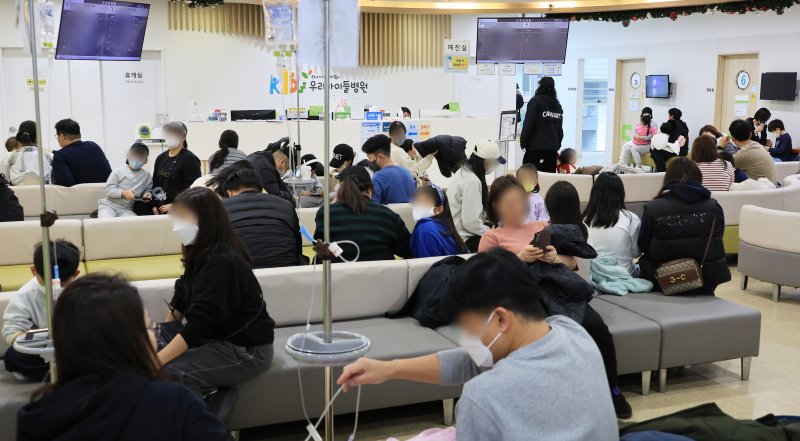"Next Week Is Expected to Peak... Is My Child Safe?" Citizens Worry as Influenza Spreads Rapidly
- Input
- 2025-11-24 15:08:17
- Updated
- 2025-11-24 15:08:17

[Financial News] Influenza cases are rapidly spreading across the country. The surge has come nearly two months earlier than usual, raising concerns among healthcare providers. Infections are particularly prominent among elementary school students, with experts predicting the outbreak will peak next week. Specialists warn that a vaccination policy focused only on high-risk groups is insufficient and emphasize the need to expand immunization to all unvaccinated individuals.
■ Hospitals See 'Open Runs'... Concerns Over Family Cluster Infections
Around 9 a.m. on the 24th, before consultations began at an internal medicine clinic in Goyang, the sound of coughing filled the waiting area. More than ten patients, including elementary students holding their mothers' hands, office workers, and elderly couples, sat in line wearing masks, waiting for their turn. At the reception desk, staff repeatedly informed visitors, "The wait will be at least an hour."Ms. Kim (42), who brought her third-grade daughter, said, "My child has been coughing a lot and had a high fever since the weekend, so I asked her homeroom teacher for understanding and rushed here as soon as the clinic opened." She added, "With influenza spreading and many of her friends catching colds, the school is recommending mask-wearing."
Han (15), a third-year middle school student diagnosed with influenza, shared, "There were many classmates coughing at my English academy on Saturday, and I think I caught it because I wasn’t wearing a mask." He continued, "With final exams coming up, I’m worried because I need to concentrate."
Anxiety is also spreading rapidly among citizens who have not yet been infected. Many are visiting hospitals or hurrying to get vaccinated even with mild symptoms. Parents of elementary school children, in particular, are concerned about family-wide infections. Ms. Choi (45) from Gangdong District said, "My child is vulnerable to fever, so I try to medicate and treat symptoms early. We are also careful to prevent transmission to grandparents, as symptoms like fever and cough can be more severe in the elderly."
Concerns about workplace transmission are also growing. Kwon (28), who works in Gangnam District, said, "There are people at my company struggling with influenza, and since it’s hard for office workers to take leave unless it’s scheduled, I’m afraid of catching it."
■ 66.3 Suspected Cases per 1,000 in the 46th Week... 14.4 Times Higher Than Last Year
According to the Influenza Sentinel Surveillance by the Korea Disease Control and Prevention Agency (KDCA), during the 46th week of this year (November 9–15), 66.3 out of every 1,000 outpatients at 300 sample clinics showed symptoms of influenza. This marks a 30.8% increase from the previous week (50.7 cases). The figure has risen steadily from 7.9 in the 42nd week. Notably, the number of suspected cases in the 46th week is 14.4 times higher than the same period last year (4.6 cases). Kim Dong-geun, head of the Respiratory Infectious Disease Response Task Force at KDCA, predicted, "The influenza outbreak is likely to continue on an upward trend."By age group, the concentration was highest among school-aged children and adolescents: 170.4 cases per 1,000 for ages 7–12 and 112.6 for ages 13–18. A pediatric clinic official in Gangnam District explained, "There are many influenza cases among elementary students who participate in group activities. If the first child gets sick, the second often follows."
Experts also identify 'school-age transmission' as the key driver of this outbreak. Kim Woo Joo, professor at the Vaccine Innovation Center, Korea University College of Medicine, stated, "The infection spreads concentrically from elementary students to kindergarteners, middle and high school students, parents, and grandparents. While children often experience mild symptoms, the elderly, those with chronic illnesses, and immunocompromised individuals are at higher risk of severe outcomes."
Professor Kim pointed out that the government’s vaccination policy is too focused on high-risk groups, making it difficult to control the overall scale of the outbreak. While the KDCA provides free national vaccination for seniors over 65, pregnant women, and children aged 6 months to 13 years, the vaccination rate among school-aged children (7–13 years) is only 47.2% (as of the 45th week). To curb the spread, experts recommend broadening vaccination to all age groups over six months old, not just the elderly or immunocompromised.
Professor Kim predicted, "This year’s influenza outbreak will likely peak next week." He added, "Even after the current Influenza A (H3N2) subtype wave subsides, there is a possibility that another wave—either Influenza A virus subtype H1N1 (H1N1) or Influenza B—could emerge in February or March next year. Therefore, even those who have already contracted influenza should consider vaccination after recovery."
He further advised, "Coronavirus disease 2019 (COVID-19) is also likely to see another winter surge in January or February next year. Those aged 65 and older should receive both the influenza and COVID-19 vaccines this season."
yesji@fnnews.com Kim Ye-ji, Park Sung-hyun Reporter